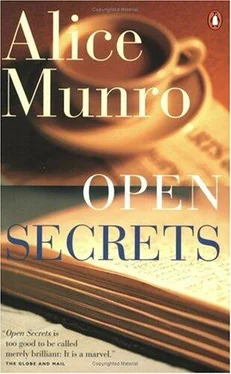“Evidently.”
Not far from these live birds was a glass-fronted case containing a stuffed golden eagle with its wings spread, a gray owl, and a snow owl. The case was an old gutted freezer, with a window set in its side and a camouflage of gray and green swirls of paint.
“Ingenious,” said Bea.
Ladner said, “I use what I can get.”
He showed her the beaver meadow, the pointed stumps of the trees the beavers had chewed down, their heaped, untidy constructions, the two richly furred beavers in their case. Then in turn she looked at a red fox, a golden mink, a white ferret, a dainty family of skunks, a porcupine, and a fisher, which Ladner told her was intrepid enough to kill porcupines. Stuffed and lifelike raccoons clung to a tree trunk, a wolf stood poised to howl, and a black bear had just managed to lift its big soft head, its melancholy face. Ladner said that was a small bear. He couldn’t afford to keep the big ones, he said — they brought too good a price.
Many birds as well. Wild turkeys, a pair of ruffled grouse, a pheasant with a bright-red ring around its eye. Signs told their habitat, their Latin names, food preferences, and styles of behavior. Some of the trees were labelled too. Tight, accurate, complicated information. Other signs presented quotations.
Nature does nothing uselessly .
— Aristotle
Nature never deceives us; it is always we who deceive ourselves .
— Rousseau
When Bea stopped to read these, it seemed to her that Ladner was impatient, that he scowled a little. She no longer made comments on anything she saw.
She couldn’t keep track of their direction or get any idea of the layout of the property. Did they cross different streams, or the same stream several times? The woods might stretch for miles, or only to the top of a near hill. The leaves were new and couldn’t keep out the sun. Trilliums abounded. Ladner lifted a Mayapple leaf to show her the hidden flower. Fat leaves, ferns just uncurling, yellow skunk cabbage bursting out of bogholes, all the sap and sunshine around, and the treacherous tree rot underfoot, and then they were in an old apple orchard, enclosed by woods, and he directed her to look for mushrooms — morels. He himself found five, which he did not offer to share. She confused them with last year’s rotted apples.
A steep hill rose up in front of them, cluttered with little barbed hawthorn trees in bloom. “The kids call this Fox Hill,” he said. “There’s a den up here.”
Bea stood still. “You have children?”
He laughed. “Not to my knowledge. I mean the kids from across the road. Mind the branches, they have thorns.”
By this time lust was lost to her altogether, though the smell of the hawthorn blossoms seemed to her an intimate one, musty or yeasty. She had long since stopped fixing her eyes on a spot between his shoulder blades and willing him to turn around and embrace her. It occurred to her that this tour, so strenuous physically and mentally, might be a joke on her, a punishment for being, after all, such a tiresome vamp and fraud. So she roused her pride and acted as if it were exactly what she had come for. She questioned, she took an interest, she showed no fatigue. As later on — but not on this day — she would learn to match him with some of the same pride in the hard-hearted energy of sex.
She did not expect him to ask her into the house. But he said, “Would you like a cup of tea? I can make you a cup of tea,” and they went inside. A smell of hides greeted her, of Borax soap, wood shavings, turpentine. Skins lay in piles, folded flesh-side out. Heads of animals, with empty eyeholes and mouth holes, were set on stands. What she thought at first was the skinned body of a deer turned out to be only a wire armature with bundles of what looked like glued straw tied to it. He told her the body would be built up with papiermâche.
There were books in the house — a small section of books on taxidermy, the others mostly in sets. The History of the Second World War. The History of Science. The History of Philosophy. The History of Civilization. The Peninsular War. The Peloponnesian Wars. The French and Indian Wars. Bea thought of his long evenings in the winter — his orderly solitude, his systematic reading and barren contentment.
He seemed a little nervous, getting the tea. He checked the cups for dust. He forgot that he had already taken the milk out of the refrigerator, and he forgot that she had already said she did not take sugar. When she tasted the tea, he watched her, asked her if it was all right. Was it too strong, would she like a little hot water? Bea reassured him and thanked him for the tour and mentioned things about it that she had particularly appreciated. Here is this man, she was thinking, not so strange a man after all, nothing so very mysterious about him, maybe nothing even so very interesting. The layers of information. The French and Indian Wars.
She asked for a bit more milk in her tea. She wanted to drink it down faster and be on her way.
He said that she must drop in again if she was ever out in this part of the country with nothing particular to do. “And feel the need of a little exercise,” he said. “There is always something to see, whatever the time of year.” He spoke of the winter birds and the tracks on the snow and asked if she had skis. She saw that he did not want her to go. They stood in the open doorway and he told her about skiing in Norway, about the tramcars with ski racks on top of them and the mountains at the edge of town.
She said that she had never been to Norway but she was sure she would like it.
She looked back on this moment as their real beginning. They both seemed uneasy and subdued, not reluctant so much as troubled, even sorry for each other. She asked him later if he had felt anything important at the time, and he said yes — he had realized that she was a person he could live with. She asked him if he couldn’t say wanted to live with, and he said yes, he could say that. He could say it, but he didn’t.
She had many jobs to learn which had to do with the upkeep of this place and also with the art and skill of taxidermy. She would learn, for instance, how to color lips and eyelids and the ends of noses with a clever mixture of oil paint and linseed and turpentine. Other things she had to learn concerned what he would say and wouldn’t say. It seemed that she had to be cured of all her froth and vanity and all her old notions of love.
One night I got into his bed and he did not take his eyes from his book or move or speak a word to me even when I crawled out and returned to my own bed, where I fell asleep almost at once because I think I could not bear the shame of being awake .
In the morning he got into my bed and all went as usual .
I come up against blocks of solid darkness .
She learned, she changed. Age was a help to her. Drink also.
And when he got used to her, or felt safe from her, his feelings took a turn for the better. He talked to her readily about what he was interested in and took a kinder comfort from her body.
On the night before the operation they lay side by side on the strange bed, with all available bare skin touching — legs, arms, haunches.
II
Liza told Warren that a woman named Bea Doud had phoned from Toronto and asked if they — that is, Warren and Liza — could go out and check on the house in the country, where Bea and her husband lived. They wanted to make sure that the water had been turned off. Bea and Ladner (not actually her husband, said Liza) were in Toronto waiting for Ladner to have an operation. A heart bypass. “Because the pipes might burst,” said Liza. This was on a Sunday night in February during the worst of that winter’s storms.
Читать дальше












